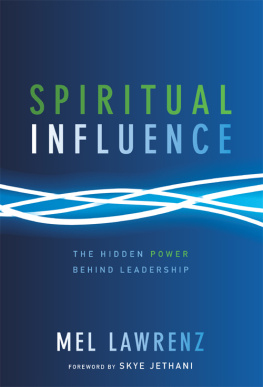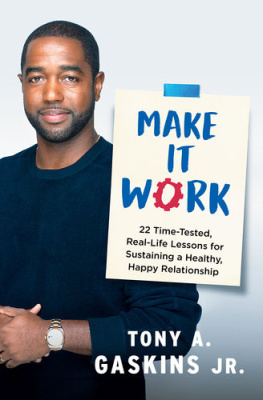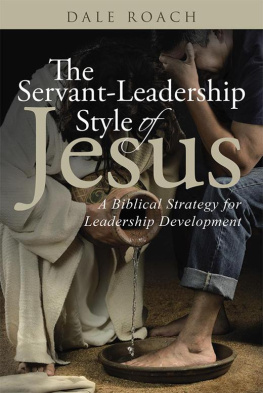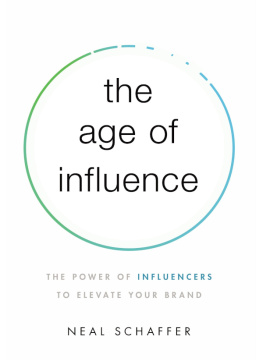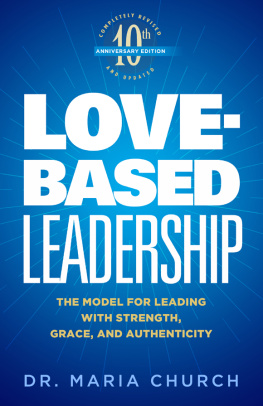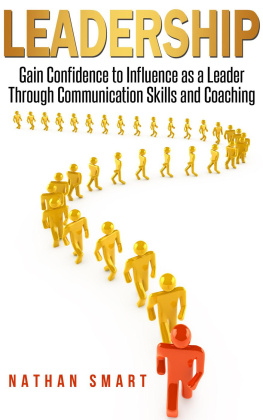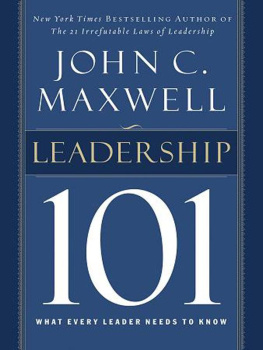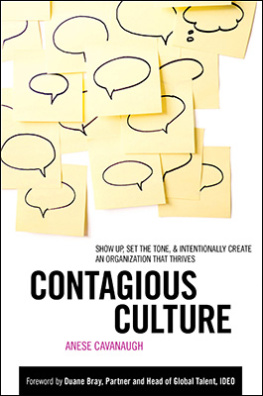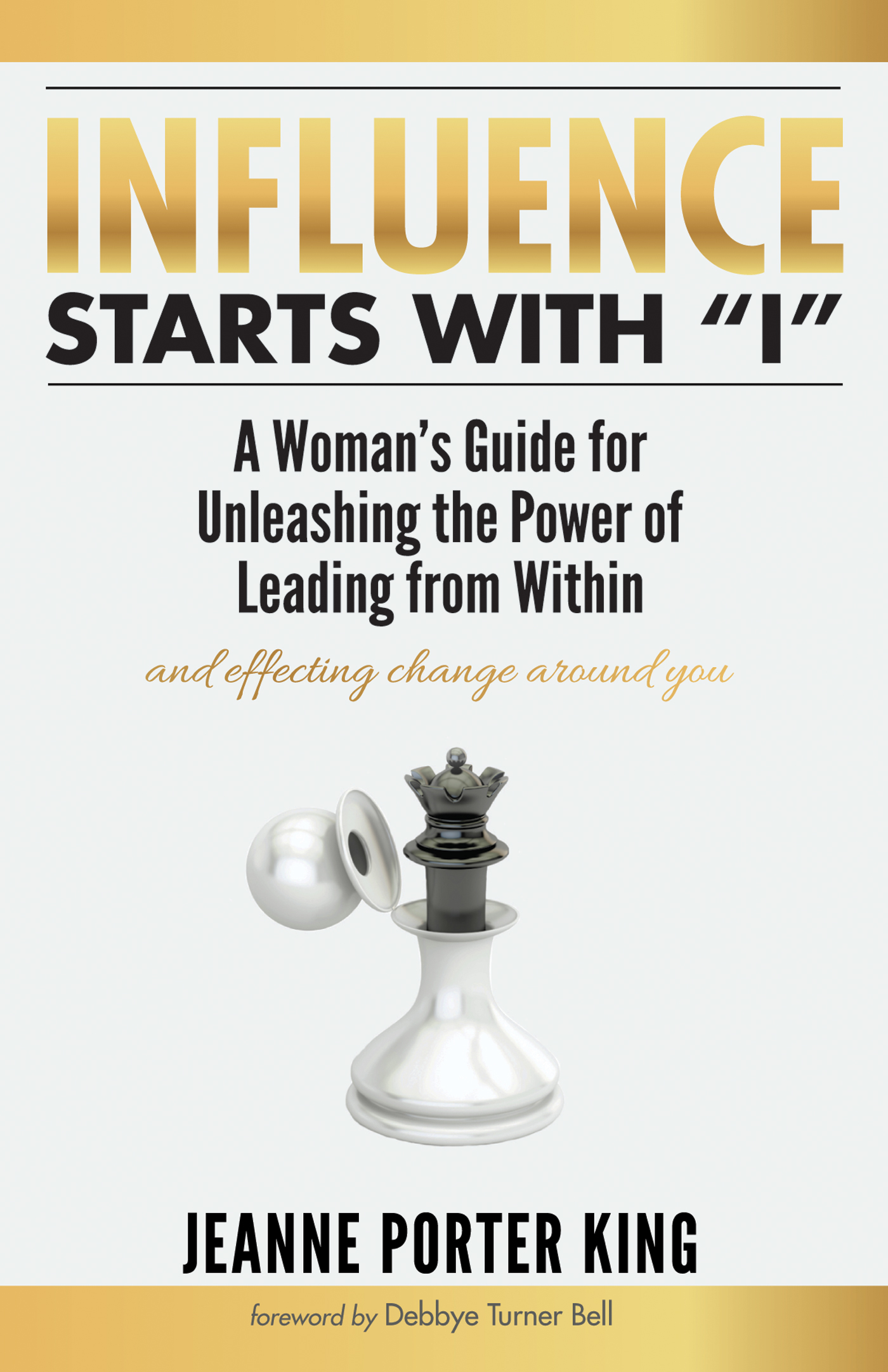To the memories of Dr. Chandra Taylor Smith and Dr. Charleyse Pratt: You both were my sister-colleagues who led from within and brought about tremendous change around you. The world lost you both way too soon, but your influence lives on.
Foreword
D r. Jeanne Porter King is a force of nature. When I met her many years ago, we instantly bonded. We were both facilitators at a womens conference. At the time I thought that bond was born out of our common backgrounds, values, and stations in life. Over time, I began to realize that Jeanne is the kind of dynamic person that makes those with whom she interacts feel empowered, special, and uplifted. Her keen intelligence, vast knowledge of women in leadership, and broad experience in coaching, mentoring, and training women leaders inspires and challenges women to be the best version of their true selves. She is the embodiment of excellence, confidence, and influence. Plainly stated, Jeannes principles on leadership and influence are extensions of her own character.
I have experienced first-hand the positive response Jeannes teaching on influence elicits. Her approach to equipping women leaders with tools for success is rooted in impeccable research, organized in easily understood concepts, and delivered with power and warmth. Common reactions to Jeannes teaching on influence are I never thought of influence in this way, I am so excited to put these principles into practice, and This is one of the best workshops Ive ever taken! Now, Jeanne has put that powerful teaching into this book, Influence Starts with I . And value is added because Influence Starts with I synthesizes more than twenty years of training, coaching, mentoring, and leading.
These are exciting times to be a woman. Women are being heard like never before in business, politics, and community. Women have cracked, if not broken through, glass ceilings as CEOs, entrepreneurs, change agents, and activists. While women are achieving new heights personally and professionally, we are facing challenges as leaders and emerging leaders that are unique to womanhood. As women strive for work-life balance, professional advancement, and personal fulfillment, it is imperative to fully appreciate the power of our purpose, individuality, and passion. And thats where Influence Starts with I provides invaluable insight and instruction.
The real power of this book lies in giving yourself fully to the process. Dont just read to glean information. Be open to true (and sometimes difficult) self-reflection. Take the time to answer the reflection/discussion questions that Jeanne poses at the end of each chapter. Your answers to these questions will help the lessons therein bloom beyond the words on the pages. Also, every chapter comes with an opportunity to act on the principles. These action items animate the lesson and help you get a -D understanding of the practical application of the chapters insights.
Influence Starts with I is part manifesto, part inspiration, part instruction manual, and part masterclass. For women (and men who want to understand and support women) who want to realize the full potential of their true purpose and talents, this book is required reading. Essential elements of success for women in life and work include vision, confidence, communication, and initiative. All of these qualities require a full understanding of influence. Influence Starts with I will shepherd the reader through grasping the importance of influence, identifying your individual strengths and purpose, developing influence strategies, negotiating barriers, and creating a plan of action to bring influence to life in your career, community, family, and friendships.
Dr. Debbye Turner Bell
CEO and Founder, Debbye Turner Bell Consulting
Veterinarian/Trainer/Motivational Speaker/Broadcast Journalist
Miss America 1990
Influence Starts with I
A Womans Guide for Unleashing the Power of Leading from Within and Effecting Change Around You
Copyright 2019 Jeanne Porter King. All rights reserved. Except for brief quotations in critical publications or reviews, no part of this book may be reproduced in any manner without prior written permission from the publisher. Write: Permissions, Wipf and Stock Publishers, 199 W. 8th Ave., Suite 3, Eugene, OR 97401.
Resource Publications
An Imprint of Wipf and Stock Publishers
W. th Ave., Suite
Eugene, OR 97401
www.wipfandstock.com
paperback isbn: 978-1-5326-6294-2
hardcover isbn: 978-1-5326-6295-9
ebook isbn: 978-1-5326-6296-6
Cover Image Source: Shutterstock, AlexXML
Manufactured in the U.S.A.
Introduction
I alone cannot change the world, but I can cast a stone across the waters to create many ripples.
~Mother Teresa
F or over a decade and a half, I have had the good fortune of developing women leaders using the principles that are found in this book. From North America to Europe, to Asia and South America, my team and I have taught influence principles and practices to women that have enabled them to speak up, speak out, ask for what they want, negotiate, and demonstrate they can be leaders who can charge forth strategically as well as care for the people who work for them. These women have become influencers in their organizations and communities and so can you.
As women who lead countries, companies, churches, communities, and homes, we need to influence others every day. Influence turns out to be one of the most foundational competencies to effective leadership in most any context. In other words, we get more done, and enact more effective change by influencing rather than coercing, dictating, or demanding.
I first came to understand the significance of influence as a key ingredient for effective leadership many years ago. At the time I was working as an organizational consultant developing and delivering diversity programs for a multinational client. The emphasis for that client at that time was helping women discover and address the things we as women did that hindered our success in the workplace. For instance, research of that era suggested that we as women talked in ways that hindered our being heard as true leaders. It suggested that we as women were too polite and hesitated to give our opinion until it was our turn to speak. In those days, according to some, our influence as women meant we had to learn ways to adapt to traditional male cultures in the workplace, while striving for balance in our personal lives.
In this clients program, the client targeted women who were at mid-level leadership in the organization but had hit the glass ceilingthe level of leadership above which few women ascended. Interestingly enough, I saw manifestations of this invisible barrier across industries and cultural groups. Women in organized religious life called that leadership threshold the stained glass ceiling. Some African American women called it the concrete ceiling, suggesting they as a group werent close enough to the top to even see possibilities of advancing to the top. Some Asian women called it the bamboo ceiling, connoting the nuanced gender barriers that many of them faced. Significant for me was when women of different cultural backgrounds were put together in programs to learn new strategies the similarity of our experiences was striking. The power was in coming together and realizing our experiences, though not exactly alike, were not isolated.


